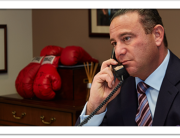 Josephine, a Nassau County parent who requested that her last name not be mentioned, felt her school district wasn’t meeting the needs of her daughter, now 15, who has an autism spectrum disorder and was getting bullied in school. Over a period of a year and a half, Josephine attended half a dozen meetings with the district. After getting nowhere, she hired an attorney, who within four months negotiated a placement for her daughter outside the district in a private, special needs school. “My daughter finally has the right placement, in a school that can meet her needs and that offers a more nurturing environment,” Josephine said.
Josephine, a Nassau County parent who requested that her last name not be mentioned, felt her school district wasn’t meeting the needs of her daughter, now 15, who has an autism spectrum disorder and was getting bullied in school. Over a period of a year and a half, Josephine attended half a dozen meetings with the district. After getting nowhere, she hired an attorney, who within four months negotiated a placement for her daughter outside the district in a private, special needs school. “My daughter finally has the right placement, in a school that can meet her needs and that offers a more nurturing environment,” Josephine said.
Education advocacy is a growing area of the law. “The increase in the number of children who have been identified as having autism or an autism spectrum disorder has led to a greater number of disputes between parents and school districts,” said Seth Stein, a partner in the nonprofit sector of Moritt Hock Hamroff & Horowitz, a Garden City law firm. “Parents talk to each other, and they are becoming well-informed and are aggressively pursuing appropriate services for their children.”
Saundra M. Gumerove, a special needs attorney in Jericho, said she is receiving more calls regarding education matters than she did three years ago. “The poor economy has an adverse impact on school districts,” Gumerove said. “When there isn’t a lot of money, school districts are less inclined to provide services.”
However, the law says every child has a right to a free and appropriate education – a right not tied to money – which creates tension between districts and parents.
The biggest sources of conflict are which services are needed (such as speech or physical therapy), the frequency of those services and where the services are delivered. If students are placed outside the school district it is at the district’s expense.
“There is a movement in New York to keep students in public schools, and for the right student, that’s fine,” Gumerove said. “But sometimes, it’s not appropriate.”
The Gersh Academy in Hauppauge specializes in educating children with neurobiological disorders. “About 70 percent of our parents had to go through the legal process to send their children here,” said founder and President Kevin Gersh. “But some school districts identify that we can do a better job for certain children.”
Attorneys say there is a range in sophistication among parents regarding knowledge of their rights and how the system works. “When parents know their rights, school districts are more apt to live up to their end of the bargain,” said Brad Gerstman, who chairs a new education practice at Uniondale law firm Ruskin Moscou Faltischek. “Many districts are excellent at providing services, while others are not interested in expounding upon the educational possibilities of special needs children,” said Gerstman, whose son is on the autism spectrum. “Because of the lack of uniform services across the state, parents are turning to attorneys.”
Parents can first request a Committee on Special Education meeting with the district to discuss the child’s needs. If, after one or more CSE meetings, the two sides cannot agree, parents can request an impartial hearing, which is a quasi-legal procedure in which an impartial hearing officer and court stenographer are present. Before the impartial hearing, there is a resolution or mediation meeting, which is a last-ditch attempt at a compromise, but, Gumerove said, disputes are rarely solved during that proceeding.
According to Gumerove, there are two schools of thought regarding when to call an attorney. Some parents hire an attorney only after exhausting all means to get services on their own, while others do so as soon as they perceive there may be a dispute.
Parents who try on their own often get advice from an advocate. Special needs schools, such as the School for Language and Communication Development in Glen Cove, provide advocacy services.
“I sit down with parents, advise them of their rights and recommend they have their child evaluated outside the school district,” said Dr. Ellenmorris Tiegerman, founder and executive director of SLCD. “Based on my knowledge of the child and the school district, I can advise them what to fight about and what not to.”
Some parents bring their attorney to the initial CSE meeting. “An attorney can go into the meeting with a well-prepared case, which will include the results of an outside evaluation from a reputable psychologist, speech and language pathologist or another professional,” said Nancy Hampton, of counsel to MHH&H. When parents come in with an attorney, Hampton said, it demonstrates they are serious about pursuing the matter. “The district’s attorney may look over the case and say to the district, ‘You have to do something about this,’” Hampton said.
When an attorney attends a CSE meeting, “the two sides will come to an agreement without going to an impartial hearing about 50 percent of the time,” Hampton estimated. And that can be a win-win situation, saving both sides legal fees as well as time and aggravation, as impartial hearings can drag on for months.
Parents aren’t equipped to go into an impartial hearing without an attorney, said Brian Goldman, a partner in Goldman & Maurer, a Great Neck law firm. “They need to ask the proper questions, lay the foundation for the case, make objections and perhaps subpoena witnesses,” he said. “They can’t do it alone.”
However, the legal costs, which Tiegerman estimates at $10,000 to $25,000, are beyond the means of many families. For those who cannot pay, some attorneys, such as Goldman, are willing to take the case for a minimal or no fee, since if the case has merit and they are successful in the impartial hearing, the district will be required to reimburse the family for legal fees, at which time the attorney will be paid. However, as Goldman pointed out, this puts such attorneys in the position of having to choose the strongest cases in order to make a living.
“Parents are spending hundreds of thousands of dollars on legal fees, and so are the school districts, who have a line item in their budgets for legal fees,” Tiegerman said. “Instead of fighting parents, wouldn’t it be better if the districts spent the money on the children and negotiated a reasonable resolution with the parents?”
However, as Gumerove noted, while parents want the best education for their children, school districts do not have to provide the best education – only an appropriate one. As long as this philosophical difference exists, so will the potential for disagreement.





